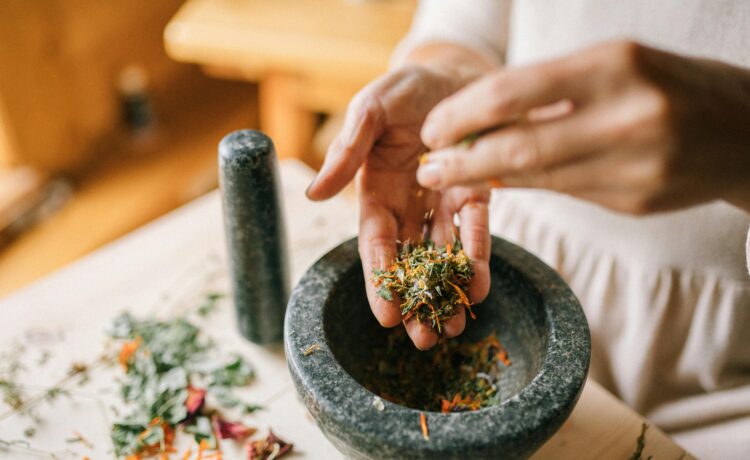Heal from stress and depression and meet nature face to face in the counselling session with the help of herbal-biotical plant treatments. The needs of a person in the past were met by taking care of their physical self as it was believed that everything is interconnected and needed an equal amount of attention – mind, body, and spirit. Let us embark on this intellectual voyage with a brief history of natural remedies, the strengths and weaknesses, similarities and differences in some of the universal compounds, and the application strategies and techniques that can enhance the introduction of such remedies in counselling. I invite you to a unique programme where the foundations of psychological work are complemented by other traditions for deep inner transformation.
History of Herbal and Botanical Medicine
Herbal and botanical medicine have its origins that can be traced back thousands of years and in most cultures it was the main source of medicine. Prehistoric people like Egyptians, Greeks, Chinese and American natives also used Herbs and Plants for healing and curing diseases. Such practices were conducted in the past and are still in use today among individuals who practise the traditional east Africa’s cultural farming practices.
As societies were in their early stages, the real professionals in this field used natural knowledge to cure people’s diseases. Some of the natural elements included were ginger, turmeric, lavender and chamomile plants which had curative powers. They were more commonly used in the form of tea, alcohol extracts, topical application of herbs or external application in the form of herbal mixtures to correct physical and psychological imbalances.
In the course of time, people widen their knowledge and usage of various herbs and incorporate them into the modern world of medicine and technology. A lot of the research carried out on plant compounds culminated in the formulation of modern pharmaceuticals from natural products. Though the demand of any herbal product has decreased over the times, the current world has seen a shift of focus back to traditional medicine due to their natural approach and cure to human ailments.
As of today, herbal and botanical medicine is incorporated into counselling that is provided to the clients as a part of the conventional therapy modalities. Hence, it’s important to understand the histories and development of these natural treatments. . .
Benefits of Herbal and Botanical Therapy in Counseling Sessions
You will learn about several advantages that courses in natural medicine can reap from integrating herbal and botanical therapy in counselling sessions. In addition to natural cures, it is beneficial to encompass the essence of plant healing where the care of the mind is as important as the body.
These herbs and botanicals have been known for their therapeutic purposes and although they do not seem to have remarkable results they are quite effective acupuncturist or practitioners of Oriental medicine could vouch for it in helping to achieve emotional equilibrium and feelings of serenity. It complements conventional methods in counselling to address the underlying issues that affect the patient.
Cone includes a cup of tea consisting of chamomile tea and lavender tea; each has its special aroma that can help cut down any level of anxiety, boost mood and promote relaxation. This means that in addition to what the counsellor is discussing, the patient can feel the natural elements under consideration.
Introducing the use of herbs and botanicals to the theory in counselling processes also contributes to the concepts of positive coping mechanisms and self-nurturing to the clients. The film depicts that accepting the gifts of nature brings such development of the environment that truly heals people.
Common Herbs and Botanicals Used in Therapy
Within counselling sessions, aromatic substances as well as herbs and botanicals take central stage in therapy.
Chamomiles are other effective plants because, besides the general healing capabilities, they provide anxiety relief, which is necessary to calm a patient during sessions. Lavender is another well known herb that has been known to help in the reduction of stress and thus giving one a calm feeling.
This oil is excellent to clear up the brain and improve attention hence helpful to those clients with issues such as tiredness and poor concentration.
Rosemary has been associated with promoting memory and cognition, which is helpful in cases where a person is sorting through their memories and dealing with trauma or repression.
Research indicates that lemon balm has mood boosting results and it might be of great help to some clients in developing positivity during the counselling sessions.
These related and familiar herbs and botanicals are great companions in a task of enhancing emotional health and constructive change within the therapeutic process.
How to Incorporate Herbs and Botanicals into Your Counselling Practice
Whether in an individual or a group setting, herbal cures could be brought into the training of the counsellor to enhance the overall practice. Begin by familiarising yourself as to which herbs have what uses or positive effects. You may also wish to try and make your working environment as stress-free and comfortable as possible; this can include having flowers or other plants in the office or using essential oils.
This means that one should introduce the use of herbs into the diet progressively depending on each client’s needs. Hence, it is always important to bear in mind any allergies or complications that might be related to the selected herbs. Provide suggestions on how the clients can continue using herbs into their dietary needs on a daily basis.
It is important to remember that in addition to helping people resolve practical problems, counselling in itself is a stress-reducing activity. You can take this one step further by incorporating herbs and botanicals into your counselling practice. The time has come to announce this more natural way of administering therapy and the potential that can be expected of it for clients.





